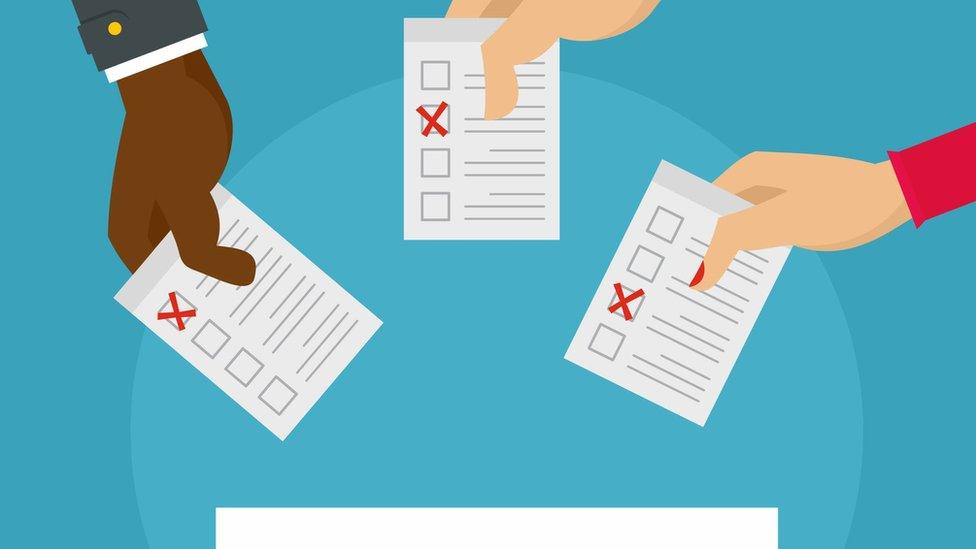What are the European elections?
- Published
- comments

On Thursday 23 May, adults in the UK - and across Europe - will be heading to the polls to vote in the European elections.
This election is for adults living in European Union (EU) countries to vote for who they wish to represent them in the European Parliament. The politicians here are called MEPs - that is, Members of the European Parliament.
Taking part in these elections is a big talking point for many people in the UK, because the UK shouldn't really have been taking part at all.
That's because it was due to leave the EU on 29 March 2019. (You can find out more about why that didn't happen by clicking here.)
Given the UK hasn't left the group of countries that vote in the European elections, UK voters are now taking part too - something which the government didn't want to happen.
What is the European Parliament?
The European Parliament decides on new laws for EU countries. It also helps to decide how much money the EU should spend and checks that all the other parts of the EU are working fairly.
Its official base is Strasbourg (France), but it carries out a lot of its work in Brussels (Belgium) and sometimes Luxembourg.
A bit like Parliament in the UK, the European Parliament is made up of politicians - the MEPs - who have been voted for by EU residents. (In the UK Parliament, they are simply called members of Parliament - or MPs.)
There are 751 MEPs in total, split across 28 different countries. Roughly speaking, the larger a country's population, the more MEPs it gets in the European Parliament.
The UK has 73 MEPs in total. Of those, 43 are seeking re-election this time around and there are 548 other new candidates.
Voting for MEPs in European elections takes place every five years.
WATCH: Brexit: The story as it stood in March 2019
Who can vote in the European elections?
It is thought that there are around 400 million eligible voters for the European elections, making them some of the biggest in the world!
But last time, just one in ten voters actually took part, so lots of people have been working hard to try to encourage more people to take part later this week.
Voting in the UK will take place on Thursday 23 May from 7am to 10pm.
Other EU countries will be voting until 10pm on Sunday 26 May though, so the British results will not be announced until then.
The new MEPs will take up their seats in Strasbourg in France on 2 July - although for the UK winners, it will all depend on whether or not the UK is still a member of the EU at that point. We'll have to wait and see.
One of the first jobs for the new MEPs will to be vote for a new president of the European Commission to replace Jean-Claude Juncker and also to have their say on the final Brexit deal.
The UK needs to vote in the European Union elections despite voting to leave the EU in 2016
How is it different to a general election?
There are some key differences between a general election and the European elections:
They involve different parliaments
In the European elections, generally adults will vote for a party, not a person - in a general election, you vote for a person, not the party
The UK is broken down into 12 constituencies for voting in the European elections - much fewer (and much bigger) than the constituencies in a general election
In each region, political parties have a list of potential MEPs - How much of the vote a party wins in a region determines how many of their MEPs from that region's list will get to take up a seat in Strasbourg
Smaller parties tend to do better in European elections than they do in the general election.
The voting system in Northern Ireland is slightly different to the rest of the UK, as voters are able to rank those on the ballot paper in order of preference.
East Midlands (five MEPs)
East of England (seven)
London (eight)
North East (three)
North West (eight)
Northern Ireland (three)
Scotland (six)
South East (10)
South West (six)
Wales (four)
West Midlands (seven)
Yorkshire and the Humber (six)
Why are European elections important?
The elections are important as it is the UK's chance to decide who represents them in the European parliament.
Some voters are not happy that they are voting in the European elections in the first place, as the UK was due to have left the EU by now (adults voted to do this in June 2016) and therefore UK voters shouldn't really have been taking part in them this year.
Some see this election as an important opportunity to understand whether the UK public still wants to leave the EU.
There are those that believe another referendum should take place to find out if UK voters really do still want to leave, but the government is opposed to this happening.
- Published11 April 2019
- Published3 April 2019
- Published16 September 2019
